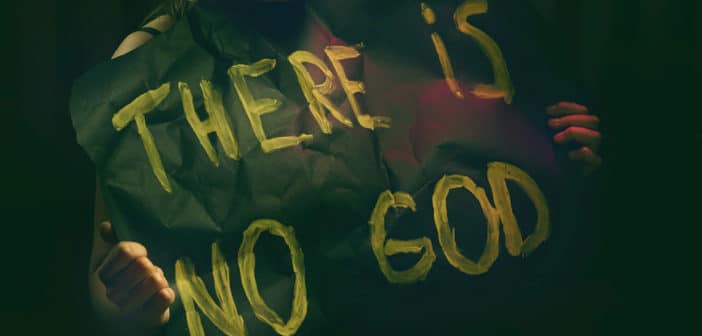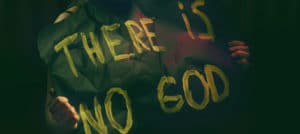This post was originally published on July 23, 2015.
One of the biggest concerns of many AA newbies is the “God thing.” I sympathize, because I still have an issue with the God thing after eight years in AA. I’ve tried to avoid it, I’ve pretended to believe, I’ve skirted the issue, I’ve done the replacement thing—using people in the rooms as my Higher Power. Now I own the fact that no, I don’t believe in God, I probably won’t believe in God, I don’t have to believe in God and I’m not even going to bother substituting for God.
There’s no way you’ll get me to believe, by the way. If you tell me I’m a jerk, if you tell me that I’m defiant, if you tell me that I’m intellectually puffed-up and need more humility, if you tell me I’ll drink unless I get on my knees and say the third step prayer, I’ll sucker punch you with a Dawkins argument.
The word, concept and connotation of a Supreme Being repels me more than sour milk.
I’m not alone in this thinking. Despite the several times God is mentioned in the steps and AA literature, there are tons of atheists in the rooms. It’s turning into a growing movement—since 2010, atheistic or agnostic meetings have doubled. It’s often what comes up when people debate SMART recovery vs AA.
WAAFT Central, which stands for We Agnostics, Atheists and Freethinkers in Alcoholics Anonymous, is a legit organization with a legit website that’s legitimately AA. How do I know? Because you’ll find their groups in the AA meeting directories under names like “Godless Heathens,” “We Agnostics,” “Freethinkers” or “Beyond Belief.”
The atheist, agnostic and freethinkers meetings are all different. Many don’t open or close with any prayers. Some don’t use the word God in any of the readings. I love the “We Agnostics” meeting near my house. It’s sort of a hybrid between a Hollywood Late Night meeting—an anarchic group of raucous folks where everyone talks during shares—and a regular old AA meeting. You don’t have to put on any saintly airs in an agnostic meeting. The newly sober kids are irreverent and the older folks are kind, open-minded and keep the meeting from veering into complete chaos
But the WAAFT website alone can be hugely helpful for anyone with the same conflict as me. Not only are there personal stories by us godless folks who have stayed sober—many over 30 years—but there’s even a podcast starting. And the site encourages people to share the word, because so many AA’s don’t even know WAAFT exists.
I didn’t know about it until a week ago, when a kind soul responded to a God post I wrote on my blog.
In addition to WAAFT, there’s a site called AA Agnostica, which holds the same principles but functions even more like a dynamic blog. The Alternative 12-Steps section is perhaps the most fascinating. Some only divert from the 12-steps in their absence of God, others don’t include the word “alcoholic” or “powerless” at all. Even more fascinating are the White Bison 12-steps, a Native American approach based on the Medicine Wheel that has the following succinct path to sobriety:
- Honesty
- Hope
- Faith
- Courage
- Integrity
- Willingness
- Humility
- Forgiveness
- Justice
- Perseverance
- Spiritual Awakening
- Service
Pretty awesome. I can definitely hang with this.
There might be a few people in AA who won’t vibe with this and it may depend on your locale—I’ve had very few problems being an “out” atheist in the rooms in Los Angeles. Still, if you’ve rewritten the 12-steps you might come across a Big Book fundamentalist who tells you that you must be “beaten into reasonableness” and become a believer. I just avoid those folks if I see them; the majority of AA’s I’ve encountered don’t seem to a give a shit, including my sponsor with 33 years.
“I don’t care what’s in that goddamn book,” the 77-year-old will say laughing, “You can be an atheist and stay sober.”
As many of us know, AA was based on the conservative Christian values of the Oxford Group. Though there’s the “God as we understood him” caveat in the steps, the language in the literature is somewhat black-and-white and often mirrors Judeo-Christian ideology. Many just don’t find that language palatable and to some degree, insisting people jump on board 100% is culturally insensitive, at least if you’re not a monotheist.
There are 12-step alternatives for Hindus, 12-step alternatives for Buddhists and 12 steps for Humanists. In fact, I have a book called 12 Steps on the Buddha’s Path, which is pretty killer.
As a freethinker, or at least someone who values thoughtful inquiry and constant questioning, I decided to sit down and rewrite the 12 steps in language that I can tolerate and with a philosophy that resonates with me. I don’t buy into the powerlessness thing anymore than I buy into the God thing. I do think I’m powerless over booze once a drop gets into my system—plenty of experience has proven this. Am I powerless over picking up that first drink? Of course not. I’ve stayed sober nearly six years and I haven’t been in some mystical trance the entire time.
With this in mind, here are my steps.
- Acknowledge that I cannot drink safely at any time, that bad shit happens to me every single time and it tears my life to shreds.
- Come to believe I am a) worth living happily and sober b) that I have the power to do things differently—I can change maladaptive and destructive patterns of thought, behavior and action, and make wise choices to stay sober and happy.
- Become willing to do things differently and make healthy choices in my thoughts, behaviors and actions through various methods, be it CBT, suggestion from wise friends, my sponsor, my father’s wisdom, a therapist, SMART meetings, meditation and the development of my own inner strength and wisdom.
- Look at the patterns of thought and behavior that don’t serve me and keep me angry, depressed, upset and lead me to drink. Where resentments are concerned, acknowledge my part, be it ever so small, so I can empower myself to change these patterns and have compassion for others. Recognize that interacting with unhealthy people is foolish and causes me harm.
- Reflect on these patterns, discuss them with someone if necessary and fully acknowledge that these things harm me and cannot continue.
- Become willing to surrender these negative patterns of thought, behavior and actions, including drinking or other addictive behavior, unhealthy romantic entanglements with douchebags, unhealthy job settings and unhealthy people.
- Take the necessary action to change these maladaptive patterns, to end unhealthy relationships and continue to take action that leads me to sobriety, sanity and wellness.
- Make a list of persons I have harmed and become willing to make amends to them.
- Make direct amends to such people, whenever possible, except when to do so would injure them, myself or others.
- Continue to watch for maladaptive behavior, without judgement, and take action to change it. Be kind and apologize when I’m in the wrong. Drive like a Taoist.
- Involve myself in positive activities, such as dance, travel, learning in classes, exercise, meditation, going to museums and readings, writing and cooking. Hang out with positive and spirit-lifting people to participate in life and keep moving forward, away from my addictive past.
- Develop an ethical compass. Treat others with respect and compassion, live with wisdom and generosity. Give back to the community when possible and to others in recovery while employing healthy boundaries. Live an example of a positive, openhearted, honest, ethical life and put the shopping cart back where it belongs in the grocery store parking lot.
How’s that for free thinking?
Sponsored DISCLAIMER: This is a paid advertisement for California Behavioral Health, LLC, a CA licensed substance abuse treatment provider and not a service provided by The Fix. Calls to this number are answered by CBH, free and without obligation to the consumer. No one who answers the call receives a fee based upon the consumer’s choice to enter treatment. For additional info on other treatment providers and options visit www.samhsa.gov.





